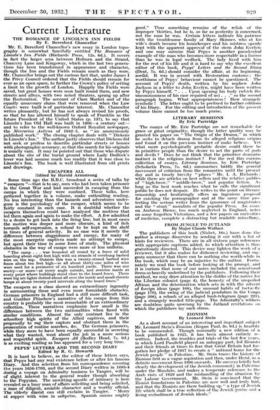ESCAPERS ALL Milted by Harold Armstrong
Some time ago the B.B.C. broadcast a series of talks by " escapers "—that is to say, men who had been taken prisoner in the Great War and had succeeded in escaping from the camps in which they were confined. These talks, here gathered together in a volume, make enthralling reading. No less interesting than the hazards and adventures under- gone is the psychology of the escaper, which seems to be fairly constant in each case. It is doubtful whether the escapers themselves could have analysed the motives that led them again and again to make the effort. A few admitted to a desire to get back into the firing line, but in most cases the motive was deeper and more obscure, a kind of itch towards self-expression, a refusal to be kept on the shelf in times of general activity. In no case was it merely the difference between sluggishness and energy, for many of the most energetic captives made no attempt to escape, but spent their time in some form of study. The physical obstacles in the way of escape were more or less uniform.
" The camp . . . was bounded all round by a fence of solid boarding about eight feet high with six strands of overhung barbed wire on the top. Outside this was a twenty-strand barbed wire fence about ten feet high—in all about thirty-one miles of wire were used for a perimeter of six hundred yards. There was one sentry—or more—at every angle outside, and sentries inside at every point where buildings stood close to the board fence. There were big arc lights dotted about all over the inside and small electric lamps at about twenty-yard intervals along the board fence."
The escapers as a class showed an extraordinary ingenuity in surmounting these and even more formidable obstacles. German prisoners in England had a still more difficult task, and Gunther Pliischow's narrative of his escape from this country is probably the most remarkable of an extraordinary collection. These narratives emphasize how small is the difference between the two nationalities when faced with similar conditions. Almost the only contrast lies in the schoolboy high spirits of the Allied captives, and their propensity to rag their captors and obstruct them in the prosecution of routine searches, &c. The German prisoners, while they seem to have been equally successful in secreting what they wanted, went about the job in a more serious and respectful spirit. Escapers AU (Bodley Head, 7s. 6d.) is as exciting reading as has appeared for a very long time.






























 Previous page
Previous page